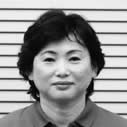Fusae Urabe

1986 Licensed Professional Chef
1972-74 Fashion Clothing company, full
time.
1975-77 Clothing Factory, full-time
1977- Medical Centre, B&B business, telephone operator, sales assistant.
The following years, however, were rather difficult for her as she struggled to express herself. Holding our workshop in a gallery sometimes confuses ordinary knitters. She has now settled down, and is developing her own techniques.
Cutting a family kimono seems like a criminal act, especially for the older generation. The kimono was once valued like jewellery, but this traditional attitude has almost died out. It is hard to know what to do with the many kimonos that are left. Should we keep them for the next generation, or use the material for dresses, cushions or exhibition pieces as she does?